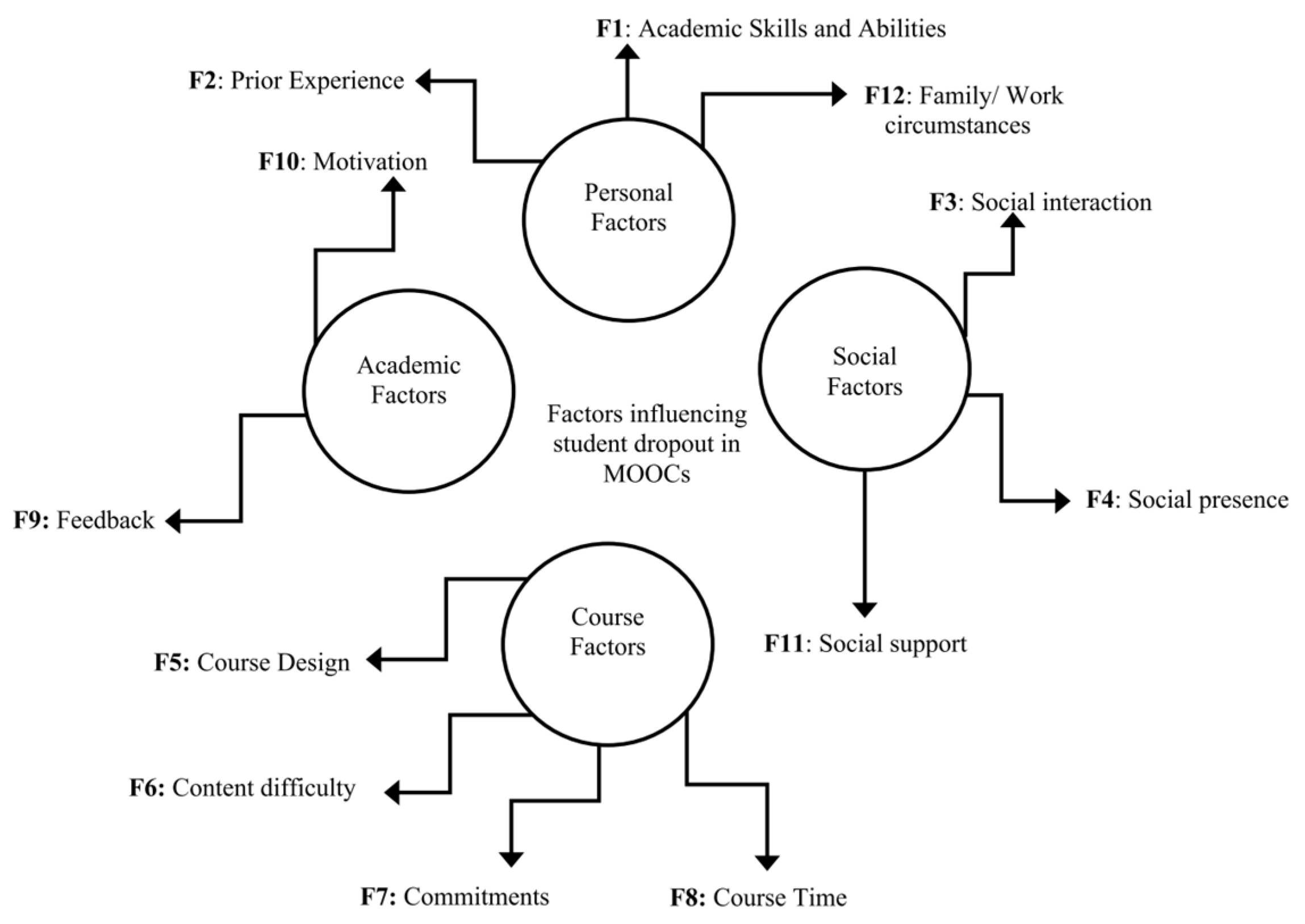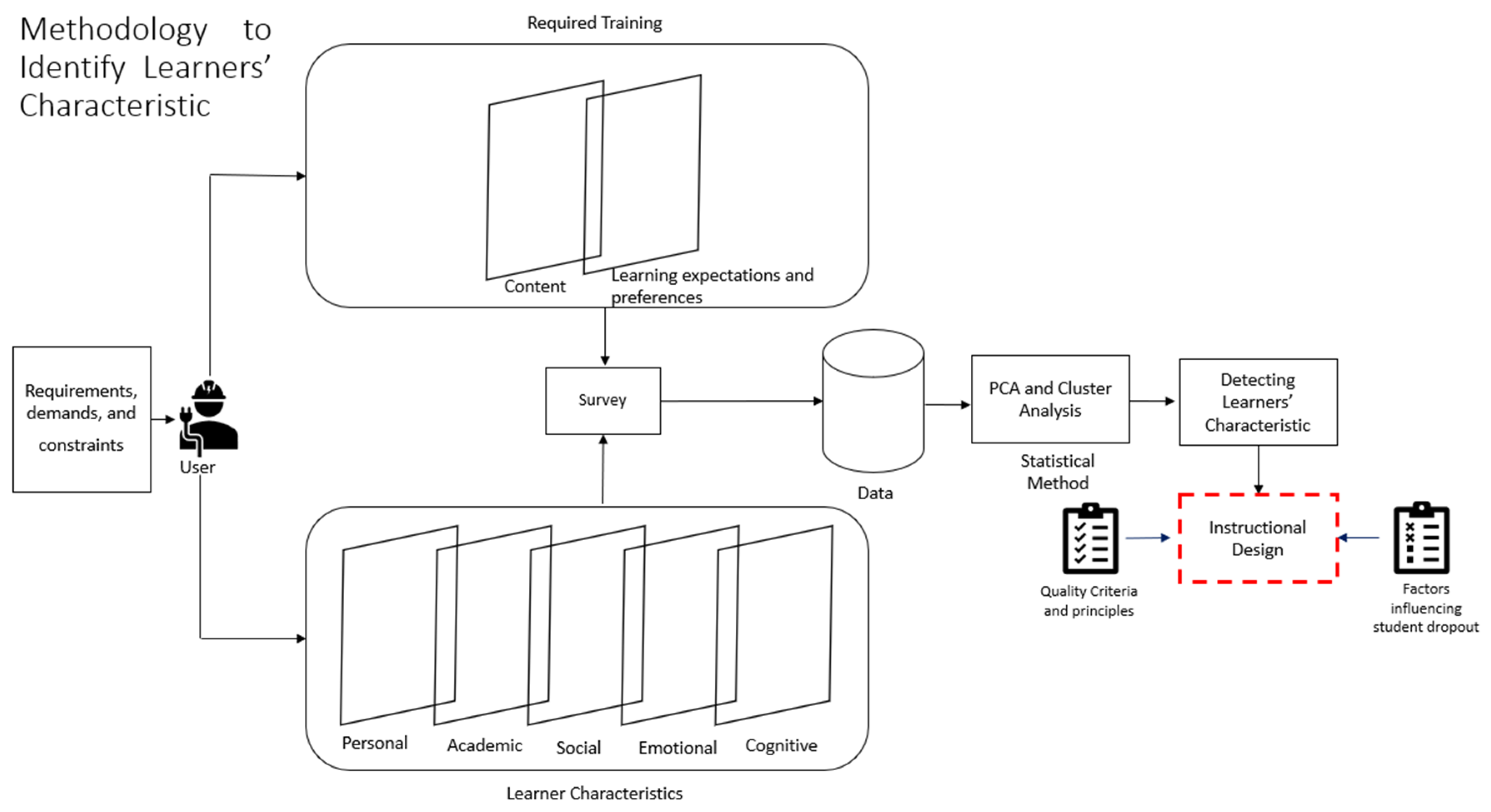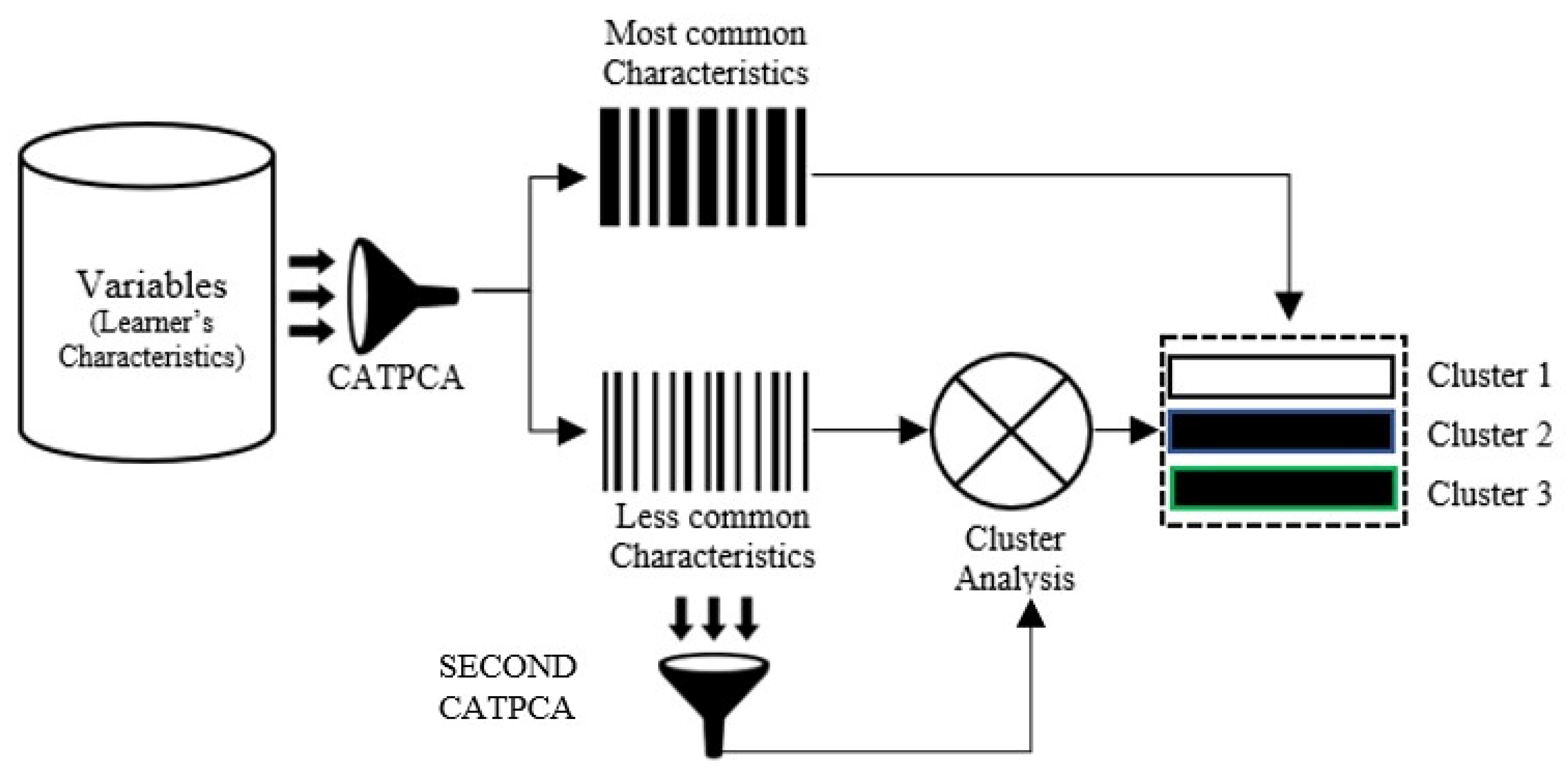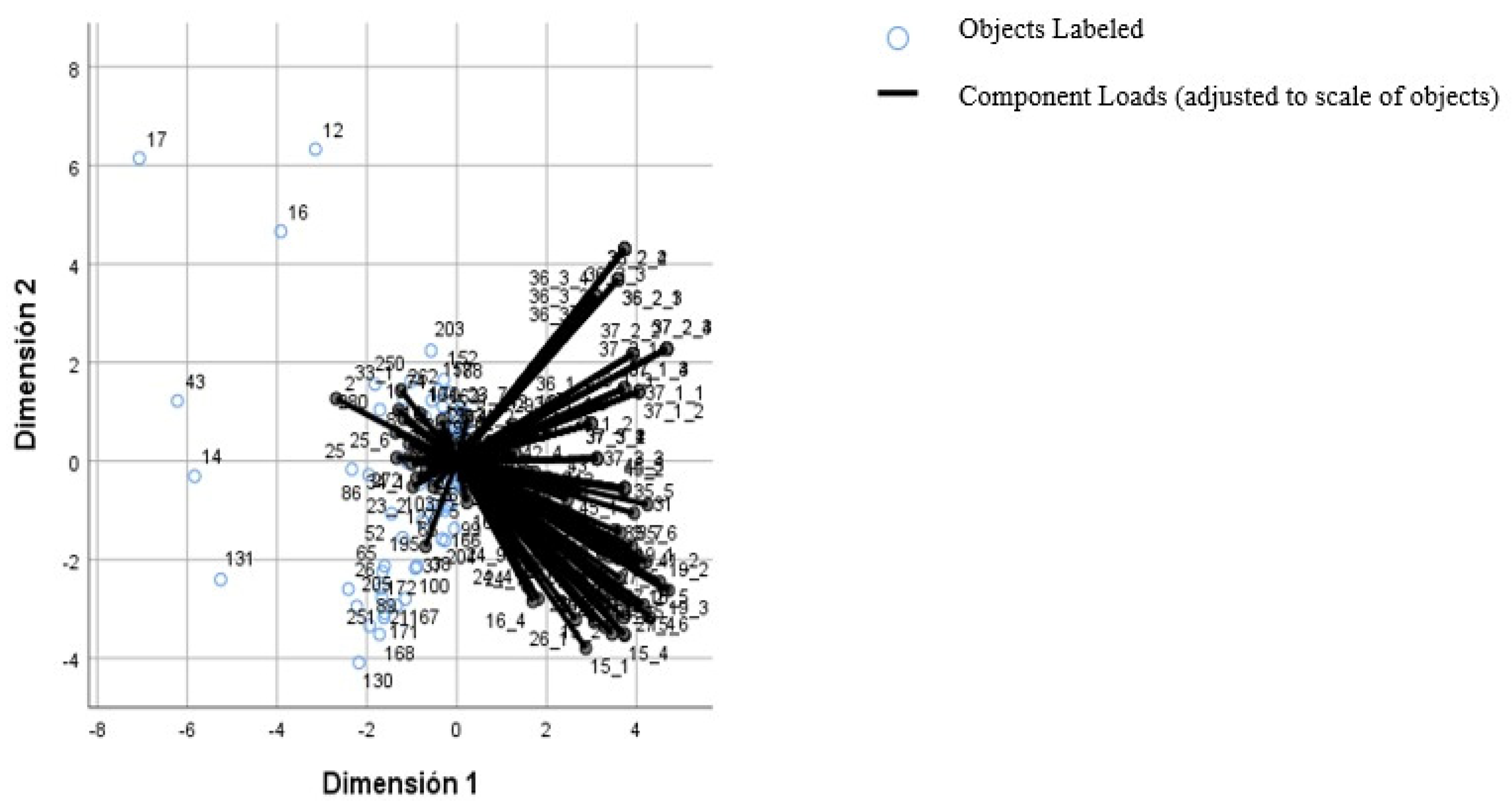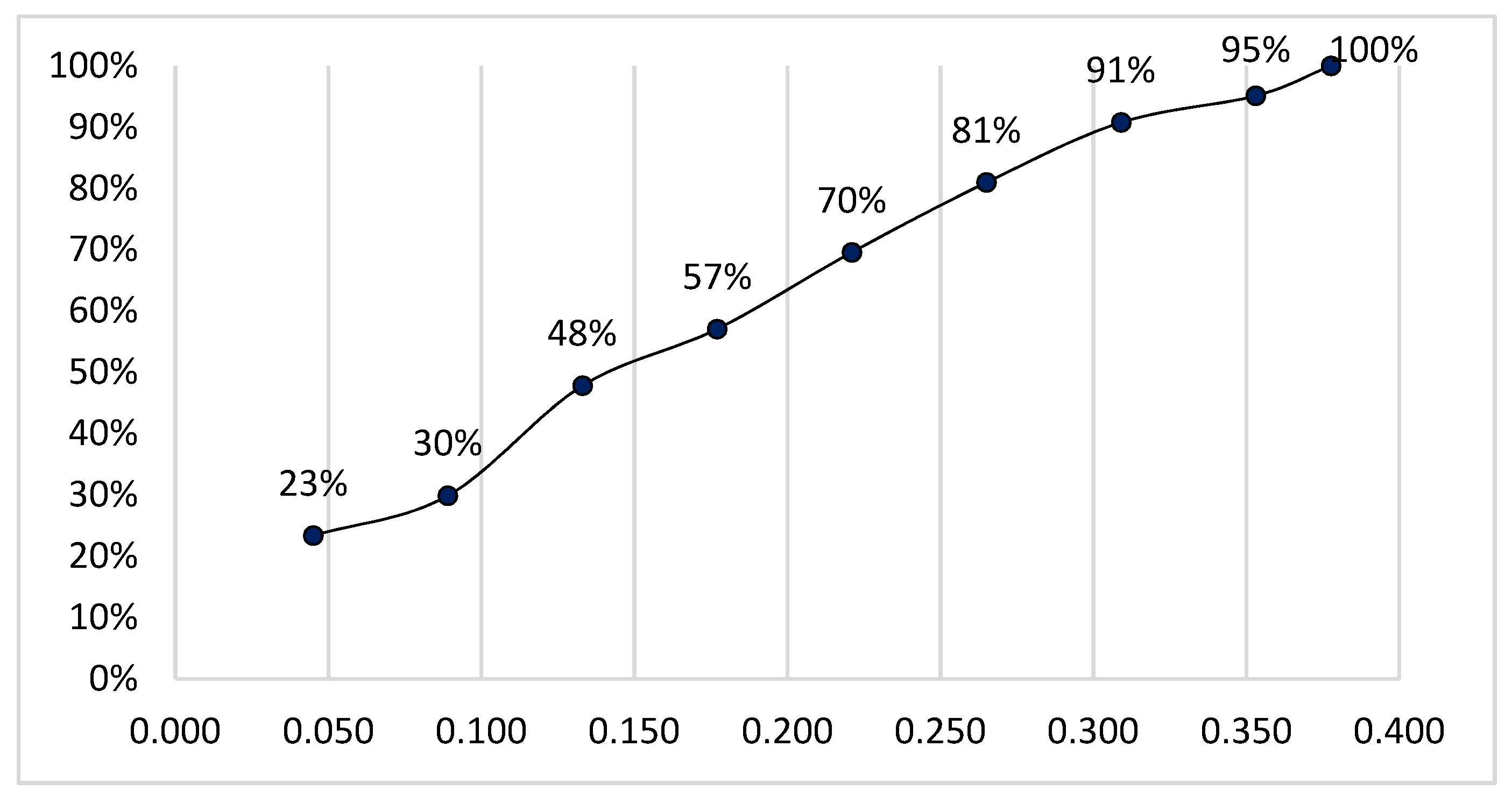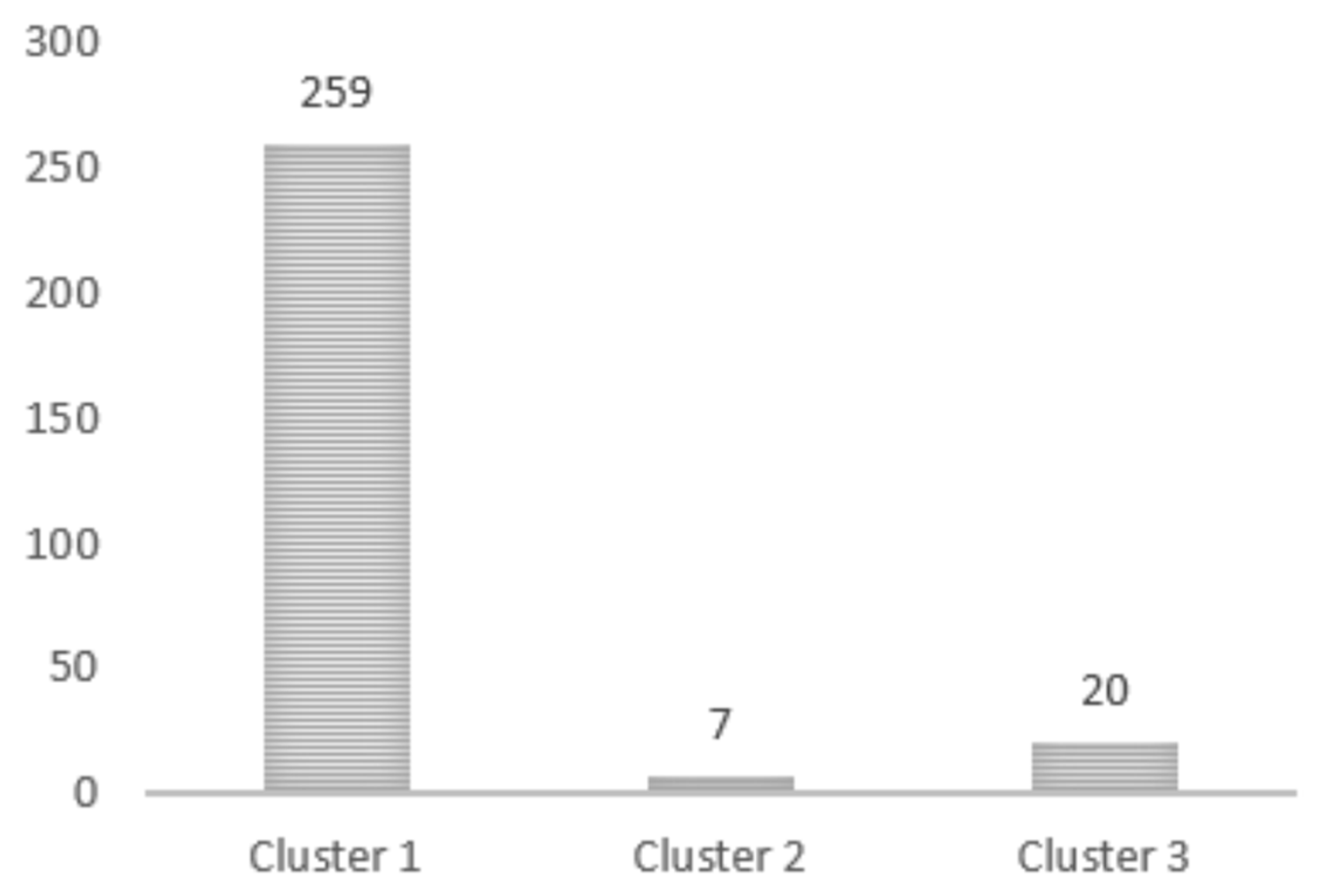Abstract
Only 35% of the Ecuadorian population consumes drinking water of “assured quality”. One of the causes is related to the deficiencies in the technical ability of the operators due to their lack of education, technical training, and experience. Massive open online courses (MOOCs) responsive to characteristics and learning needs are an option to strengthen the skills of operators. The goal of the present study is therefore to describe a methodology that includes the application of a survey and the use of statistical methods such as categorical principal component analysis (CATPCA) and cluster analysis to identify and assess learning characteristics. The results present the most frequent variables in the personal, academic, emotional, social, and cognitive aspects. They also show the preferences and learning needs of the operators. Finally, it is concluded that this study identifies common learning characteristics, needs, and preferences that are relevant for the creation of a quality personalized instructional design in MOOCs.
1. Introduction
Only four out of 221 municipalities in Ecuador have received the quality seal for drinking water consumption by the Ecuadorian Standardization Service (INEN) [1]. As a consequence, only 35% of the Ecuadorian population consumes drinking water of “assured quality” because these municipalities meet the INEN 1108 Standard criteria [2].
Some municipalities cannot meet these standards because they lack insights and technologies for drinking water treatment and are facing limitations in administrative and operational management. At the operational level, one of the reasons is related to the technical skills of the operators because their education level is elementary or high school, and their technical knowledge is empirical, which leads to deficiencies in the water production process [3,4].
The academic offer from higher education institutions (HEI) in Ecuador does not respond to the number of workers, technicians, or engineers that the drinking water system demands in all of the country’s municipalities [5].
These difficulties mentioned also occur globally, for example, in countries like Mali, Bangladesh, South Africa, Zambia, Tanzania, Mozambique, Burkina Faso, Niger, Senegal, and the Philippines, among others, which were the subject of a study carried out in 2015 by the IWA [6]. In addition, some deficiencies are related to the training and retention of human talent. These are:
- The educational offer does not adjust to the needs of the market.
- A lack of financial resources to recruit and retain staff.
- The number of existing technicians or engineers is insufficient for the market’s needs.
- Most human resources have elementary and high school instruction.
Considering the scales proposed by the World Health Organization (WHO)/UNICEF at the Latin American level in the Joint Monitoring Program (JMP), it is not only Ecuador that has significant deficiencies in areas such as drinking water (drinking water from an improved water source that is located on the premises, available when needed, and free from fecal and priority chemical contamination), sanitation, and hygiene (the availability of a handwashing facility on the premises with soap and water), but also countries such as Colombia, Peru, Bolivia, Guatemala, and Paraguay. These countries have considerable deficiencies in at least two of the aforementioned areas. Moreover, considering the income-level indicator established by the World Bank related to inequality in water access (World Bank Country and Lending Groups—World Bank Data Help Desk), the list extends to countries such as Venezuela, Nicaragua, and Haiti. Suppose we add those countries with the same deficiencies in Africa, Asia, and Oceania, which number more than fifteen [6], it can be determined that it is a global problem. In summary, technical skills training for water operators is a local, regional, and global need to strengthen the processes related to drinking water treatment and subsequent consumption.
A solution to strengthen operators’ technical skills could be creating a massive open online course (MOOC) because it is easily accessible and is of significant size. However, creating a MOOC for water operators involves several aspects, including access to quality equipment and the internet, the level of education, digital literacy, and course design, and another issue that cannot be ignored is the dropout rates that are between 90% and 95% [7,8,9,10,11]. These aspects have led researchers to ponder the idea of creating personalized MOOC courses since 2013, a year after the growth of MOOCs. In their paper “Education Reflections on Stanford’s MOOCs”, Cooper and Mehran mention the need to personalize courses with learning environments that respond to the students’ unique learning needs [12]. Likewise, in 2015, Zapata Ros said, “in personalized education, the instructional design is individualized as a whole, or as far as possible, to adapt it to the learning characteristics detected in the student’s environment” [13]. Hence, the design of a personalized MOOC requires an analysis of the requirements, demands, and concerns that students have when taking a MOOC.
The most common way to personalize a MOOC is through adaptive learning. However, this happens when the student is already taking the MOOC, which could lead to student dropout in the first few weeks because there is no prior analysis of their preferences, interests, requirements, or unique learning needs. It has not been found in the literature how learning characteristics such as [11] personal, social, emotional, cognitive, and academic characteristics are identified, rated, and considered in the instructional design of a personalized MOOC.
This context creates a challenge due to the high heterogeneity that the learning characteristics of the operators could have, due to the sociodemographic situation of Ecuador, which is marked by inequalities at the social, cultural, economic, and technological levels. These differences become even more acute in small cities, parishes, or rural areas. Therefore, it is imperative that the identification and assessment of the characteristics and learning needs correspond to the operators who come from large, medium, and small cities. In this way, it will be possible to obtain a student profile and the number of operators that is represented by that profile. Ideally, the profile would represent most of the operators and thus the MOOC developed in the future would be relevant and respond to the needs of the greatest number of people. Hence, our study uses statistical methods to analyze data and identify and assess operators’ characteristics and unique learning needs. Using the studies that describe the characteristics of learning in people [14,15] and the factors that influence dropout in MOOCs [11], in this paper we:
- Perform a systematic literature review for a correct survey design that identifies variables focused on the learner’s learning characteristics.
- Identify the most frequent learning characteristics through a survey for data collection and a principal components analysis.
- Apply cluster analysis to determine how the operators can be concentrated in a single cluster according to their learning characteristics for developing MOOCs that address the operators’ needs.
2. Background Work
2.1. Water Management and Administration in Ecuador
At the beginning of our study, a situational analysis was carried out to identify the strong points and areas for improvement in the Ecuadorian drinking water system. This analysis focused on understanding the quality standards to produce drinking water, the organizational structure of the companies, and the technical skills of the drinking water system operators. The analysis explored Ecuador’s drinking water sector’s strengths and opportunities. A framework of international standards was identified from the United States, Europe, and China, as well as guides for those countries that do not have standards. The parameters established in the Ecuadorian INEN 1108 standards [2] were based on the guidelines issued by the WHO [16]. Moreover, the standard methods for the examination of water and wastewater issued by the American Public Health Associations (APHA), the American Water Works Association (AWWA), and the Water Environment Federation (WEF) were used [17].
- (a)
- Regarding the organizational structure, the WHO has defined functions for operation and maintenance (O&M) in the water sector, and these functions are generally carried out by (a) senior officials; (b) supervisory staff; (c) administrative staff; (d) technical staff; and (e) operators. The definitions of the roles are briefly described below [18,19].
- (b)
- Senior officials carry out the planning, organization, and financing of O&M, including a continuous effort to improve equipment and facilities.
- (c)
- Supervisory staff must monitor staff performance and ensure that the best approaches are taken for operation and maintenance tasks.
- (d)
- Administrative personnel must guarantee administrative support for managing human resources, transportation, purchases, and stock of spare parts and materials.
- (e)
- Technical personnel are highly specialized personnel responsible for specific aspects of O&M, including instrumentation, laboratories, and equipment maintenance.
- (f)
- Operators carry out the practical activities of operation and maintenance, generally under the guidance of a supervisor.
These definitions in Ecuador are the same according to the opinions of managers or heads of water treatment plants in Ecuador (the interviews carried out were with the managers and heads of treatment plants in the municipalities of Guayaquil, Galápagos—Santa Cruz, Portoviejo, El Empalme, Playas, Santa Elena, Salinas, and La Libertad). Table 1 shows the equivalences.

Table 1.
Roles in international and Ecuadorian O&M.
Although the names of the roles are similar, this does not mean that the level of knowledge or technical skills are the same. For example, the California Water Board establishes the minimum qualifications to certify five types of water treatment operators. The most basic requirement is completing a college degree and passing a knowledge certification exam. In contrast, the most experienced operators must have completed three 36 h drinking water, wastewater treatment, or water distribution courses in high school. They must also have three years of experience as an operator and pass the knowledge certification exam [20]. Unfortunately, this knowledge and experience certification system established by the California Water Boards does not exist in Ecuador.
In short, Ecuador has the INEN 1800 standard that responds to international standards. It has an organizational structure where the hierarchical positions respond to functions or roles recommended by international organizations, but according to interviews with treatment managers of drinking water plants: the knowledge, skills, and experience of its operators often do not meet the needs of a water treatment plant, which it is that the operators have a range of knowledge and skills in the processes of Source Water; Water Treatment; Operation/Maintenance; and Laboratory Procedures [21].
The challenge is how to train or strengthen skills and knowledge through a MOOC that responds to global best practices, but considers local learning needs such as level of education, technical knowledge, experience, and digital literacy. In the next section, we will explain the systematic literature review that was carried out to understand the challenges and opportunities associated with MOOCs.
2.2. MOOC Framework
In 2008, the term MOOC (massive open online course) was coined by George Siemens (University of Texas Arlington) and Dave Cormier (UPEI), who created their first course, CCK08, to present a new learning theory—Connectivism [22,23]. Four years later, the New York Times named 2012 “The Year of MOOCs”, and from that moment on, the growth of MOOCs has been exponential. The case is that today, Coursera, the largest MOOC platform, offers approximately 8250 courses with more than 97 million students, followed by edX with more than 3000 courses and approximately 42 million students [24]. However, MOOCs still have problems with high failure rates, the design of practical activities for engineering careers, assessment type, feedback, communication, and interaction, as well as the maintenance and sustainability of the MOOC [25].
With this context and considering the learning needs of drinking water treatment operators, we believe that it is important to understand the different types of MOOCs that exist, the quality approaches, activities, and most used resources both globally and specifically in water MOOCs. This will allow us to have a context to ask the operators the types of activities they prefer in online courses. For this reason, a systematic literature review was carried out [26] to understand the challenges and opportunities that MOOCs currently have. The query used in the Web of Science database was:
TITLE: (“MOOC” OR “MOOCS” OR “MASSIVE OPEN ONLINE COURSE”) OR TOPIC: (“MOOC” OR “MOOCS” OR “MASSIVE OPEN ONLINE COURSE”)
The inclusion criteria were:
Topic: MOOC
Setting: Technical Knowledge Application
Focus: Empiric (Qualitative or Quantitative)
Sample: Operators
Educational Background: Elementary or High School
Years: 2016 to 2020
2.2.1. Quality MOOC: Types, Characteristics, Activities, Resources, and Tools
Two different pedagogical forms of MOOC, which can be considered “process” or “content-based” approaches, have been discussed in the literature. These are cMOOCS and xMOOCS [27]. The first type is connectivism or cMOOCs, and their approach is based on mass communication and interaction. On the other hand, xMOOCs have been labeled as a knowledge transmission model, using video conference recordings in the classroom. However, some believe these two approaches have a simple or reductionist view [28]. Other researchers presented an eight-type MOOC taxonomy with a different pedagogical perspective, such as transfer MOOCs, made MOOCs, synch MOOCs, async MOOCs, adaptive MOOCs, group MOOCs, connectivism MOOCs, and mini-MOOCs [29].
General parameters with different approaches cannot define the quality of MOOCs. However, one aspect considered to measure quality is the type of learning and how effective it is for students in achieving the objectives set. Another aspect is the number of students who complete the courses or the dropout rate. However, this type of measurement could be questionable because it has traditionally been applied in face-to-face education with other learning environments, different activities or resources, and other learning theories [30]. Thus, it invites us to reflect on whether it is a quality measure—even more so because it depends on each student’s objectives [31], interests [32], or preferences [33].
Currently, the courses on world-renowned platforms could respond to the global training needs of industry, society, or academia, but the question remains of whether these courses’ learning activities are responding to the students’ needs, interests, or learning preferences. There are experimental studies that show unsatisfactory performance due to (1) the heterogeneity of learning characteristics; (2) the teaching methods used; and (3) learning activities not responding to students’ interests, tastes, or motivations [34,35,36]. In 2009, Siemens [37] said: “The question for me is not ‘how do people connect?’, but ‘what are the implications of people being connected in a certain way?’”. Therefore, the activities or learning resources related to the course’s objectives must generate interest or motivation to achieve student involvement and positively impact the MOOC’s performance. In this sense, the most functional MOOC platforms—Coursera and edX—have tools to design innovative learning strategies that motivate students to perform positively. Among the most-used resources in MOOCs are videos, readings, forums, wikis, quizzes, and exercises with options such as multiple choice, fill-in-the-blank, and text, among others [38,39]. Likewise, there are principles and quality criteria for the design and development of MOOCs that guide the development of courses that respond to the needs, requirements, and demands of students [40,41].
At the end of 2020, we reviewed MOOCs with content related to drinking water treatment to identify the type of resources and learning activities used for this sort of technical training. These courses are usually offered to undergraduate students or professionals. Table 2 below identifies the types of resources or activities found for the MOOCs.

Table 2.
Types of resources and learning activities in water treatment MOOCs.
This context developed an understanding of the current situation of MOOCs and highlighted opportunities in an instructional design for a drinking water MOOC. We believe that the MOOC is an effective way to spread knowledge as long as the final result positively impacts student learning.
On the other hand, it is also important to acknowledge the factors that could affect student performance, not only at the level of course design, but also in terms of each student’s personal, social, emotional, academic, and cognitive characteristics. Therefore, in the next section, we propose the dropout rate as an element that allows us to understand how various factors related to the student’s learning characteristics influence dropout.
2.2.2. Drop Out
The dropout rate is considered as the decrease in the number of students from the beginning to the end of a specific course. It can also be said that it is equivalent to the number of students who did not obtain a certificate in the MOOC [42].
Regarding the factors that influence dropout, the literature mentions factors related to social, personal, and course design issues such as motivation, social interaction, gender, geographic location, course activities, and resources (see Table A1). The literature is pervasive concerning the factors that influence dropout. However, there are factors where the frequency is more significant than others, such as course design, social interaction, motivation, and course duration. In a literature review between the years 2009 and 2019, the authors analyzed the factors that influenced the dropout rate. They identified 12 factors grouped into four dimensions: personal, social, academic, and course design and development factors. [11]. As a result, it was ascertained that the factors that most influence dropouts are F1: Academic Skills and Abilities and F5: Course Design, because they are factors that influence the rest; that is, if a student has professional experience, but the quality of the course does not meet their needs, it is likely that the student will drop out of the course. On the other hand, if a student’s skills and abilities do not reflect the level of complexity of the course, the student will most likely be frustrated because they do not have the prior knowledge required, thus, they drop out [11]. Figure 1 shows the grouping of these 12 factors.
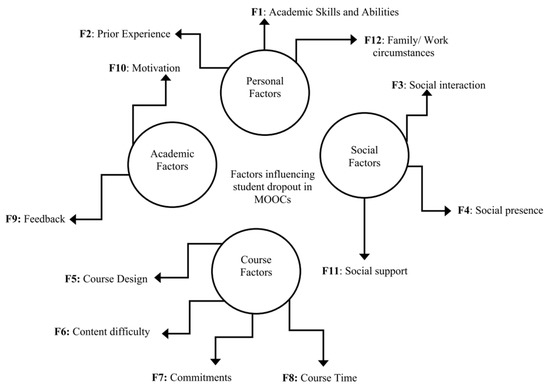
Figure 1.
Factors that influence the dropout rate.
In short, this review implied an essential input in the survey design to determine which factors could mean a risk of operators not completing the course.
2.2.3. Personalized Learning in MOOCs
Currently, the most common way to carry out a personalized MOOC is through adaptive learning. This method uses the data obtained on students’ MOOC performance and applies learning analytics and data-mining techniques to identify the factors that promote positive performance. It is also used to create new learning strategies and adapt them to the following topic, module, or course [43]. Other adaptive learning techniques identify similarities in student interaction or learning styles to adapt new learning activities and promote better student performance [44]. In fact, some studies have identified the navigational behavior of students to accurately align with learning styles [45]. There are numerous models and theories of learning styles [46,47], and one of the models that has been applied in MOOCs is the Felder–Silverman learning-style model (FSLSM) while focusing on an adaptive learning approach [48,49]. This model distinguishes between four dimensions [46,50]: information processing (active or reflective learners); information reception (visual or verbal learners); information perception (sensing or intuitive learners); and information understanding (sequential/global learners). These dimensions are helpful to ground the navigational styles discussed in the MOOC instructional design. The difference between the FSLSM and alternative approaches is that it also incorporates learning and instruction models, such as Kolb’s [51] and Pask’s [52]. In short, the styles respond to the contexts of the individuals; in some studies, the students have more reflective styles [48] while in others, they are more sequential [44]. There are also studies that show platform administrators recommending a certain type of MOOC based on the characteristics of the students. However, the results have not been satisfactory due to the heterogeneity of the participants. Another way of carrying out personalized learning in MOOCs is gamification, which considers academic, emotional, cognitive, and personal aspects, but mainly social aspects because its application requires sharing the same environment to interact with each other [53].
Although adapted learning is a way of responding to unique learning needs, this happens after the student is already taking the course, which could lead to student dropout in the first few weeks because there is no prior analysis of their interests, requirements, or needs. On the other hand, recommending already created courses and then directing them based on the participant’s characteristics does not show satisfactory results, either. Gamification is a technique that considers the learning characteristics of a person as an important input for the design and development of the course. However, the main focus is the social aspect [53]. From our perspective, the personalization of learning in MOOCs involves identifying learning characteristics that are related to emotional, cognitive, academic, social, and personal aspects to respond to unique learning needs [15,54]. In addition, the personalization of learning should include activities that allow the student to demonstrate, apply, and integrate knowledge and, with authentic resources based on real activities, promoting transformative learning [55,56]. According to Mezirow’s theory of transformational learning, this is education that allows the student to go through a process of critical reflection, leading to a transformation in their thinking [57]. However, for transformative learning to occur, students also need to be provided with opportunities that allow them to act [57]. Therefore, the design of a MOOC should also provide activities and resources with an effective approach (interviews, testimonials, and documentaries) that generate an emotional dissonance that motivates the student to act in the course activities and, in turn, identify actions that can be incorporated into daily activities [58,59].
For now, identifying and valuing learning needs and characteristics as an important input in the design and development of a personalized MOOC could be a gap in the literature. Indeed, based on the literature reviewed, we decided to add two additional characteristics to this study related to training needs and expectations. The first refers to the training content that operators require to strengthen their technical skills. The second characteristic is related to the expectations of the online course, which refers to how the operators would like to learn according to their interests, preferences, and motivations.
2.3. Research Questions
The existing literature provides fundamental evidence on the water sector’s needs regarding operators’ technical skills training. It also refers to the limited academic offer that does not meet the market’s needs, and the low number of professionals trained in the sector. However, there is a vast opportunity to train and strengthen the technical skills of operators through e-learning training, specifically through MOOCs. However, the literature provides reliable evidence that the creation of a MOOC brings educational and technological challenges, as well as the need to identify student learning characteristics for positive performance. In addition, there is a limited understanding regarding the implications that the design of a MOOC should have to adopt learning strategies that motivate, encourage, and commit the student to have a positive performance. Studies carried out by Kizilcec, Jordan, Kaplan, Medina, Fend, and Aldowa show that some factors and learning strategies influence the desertion of traditional MOOCs, resulting in a low passing rate of between 4% and 12%.
For this reason, this research focuses on identifying and assessing the water system operators’ learning needs and characteristics. Additionally, it seeks to determine a conglomerate with the largest number of people with common characteristics. This analysis would allow the creation of a MOOC in the future that positively impacts student learning through authentic activities and resources to respond to the characteristics, needs, and learning preferences of a large number of operators of the drinking water system in Ecuador. Two research questions have been posed to achieve this aim.
RESEARCH QUESTION 1:
Among all operators, what are the most frequent learning characteristics, training needs, and preferred ways of learning?
RESEARCH QUESTION 2:
What are the learning characteristics of the largest cluster of operators?
3. Materials and Methods
The background of this work allowed the proposal of a methodology to identify and value the characteristics and learning needs of the operators, taking into consideration aspects such as personal, academic, emotional, cognitive, social, training [53], and learning preferences on an online course [32]. The researcher used the literature review to identify the variables associated with learning characteristics and training needs, allowing the design and application of the survey and, in turn, to assess the characteristics from data analysis that used statistical methods including principal component analysis (PCA) [60] and cluster analysis [61,62]. Furthermore, a personalized MOOC is to be created considering the results obtained in this study, the factors that influence dropout, the criteria of a quality MOOC, and the principles for quality instructional design [40,41]. Figure 2 describes the methodology used.
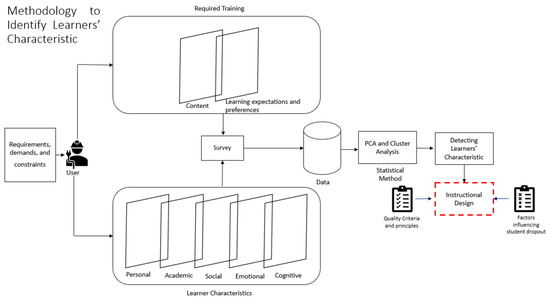
Figure 2.
Methodology to identify learning characteristics.
3.1. Procedure to Design and Apply the Survey
In this study, Guayaquil, which is the city with the largest population in Ecuador, was considered. However, to better understand the heterogeneity or diversity of the operators’ learning characteristics, other cities were selected based on the population quintiles Q25, Q50, and Q75. Twelve cities were selected, and eight cities confirmed their participation (67%): Guayaquil (Q > 75), Portoviejo (Q50), El Empalme (Q25), La Libertad (Q25), Santa Elena (Q25), Salinas (Q25), Villamil Playas (Q25), and Gualaquiza (Q25). In the case of Guayaquil, the Posorja parish and Puná Island were also included.
Each city has a water company. Thus, the population was divided into subdivisions so that each element would have the same probability of being chosen to estimate the sample in each stratum [63]. Finally, by applying stratified sampling by city, we determined that the total sample size was 286 workers. The selected sample corresponds to the cities that confirmed their participation in the project and 100% of the sample was surveyed.
To identify learning characteristics and needs, we extracted some variables from previous studies, namely, personal, academic, social, emotional, and cognitive. Likewise, we proposed variables related to the expectations, interests, preferences, and motivations to take an online course and the content for the training. Table 3 describes the variables that were used to design the survey.

Table 3.
Variables to identify characteristics and learning needs.
Before administering the survey, a pilot was carried out in El Empalme to assess the following issues: (i) determining whether the operators understood the questions; (ii) determining the estimated response time; (iii) identifying written errors; (iv) assessing whether the response options captured the expected result; and (v) determining the best way to administer the survey, i.e., digitally or in person [77]. Finally, the survey was administered in person because it made it easier for the operators to fill in. In addition, some questions were corrected to improve their understandability, and the survey duration was found to be fifteen minutes. Table 4 shows the variables, the text, and the type of each question in the survey.

Table 4.
Survey to identify characteristics and learning needs.
Using the research data lifecycle [78], the data planning, collection, processing, and analysis followed a standardized procedure. This process began with signing agreements between the university and the municipality or water company to formalize the collaboration, responsibilities, and consent to using project data. The operators were also informed through the survey about the importance and objectives of the research and its confidential nature, and with their consent, the survey was conducted between 3 May and 1 October 2021. In addition, any identifiable information contained in the operator responses was removed to protect the anonymity of the operators.
The data were converted electronically, creating a table where the fields were the questions, and the records were the respondents’ answers. Finally, a categorization structure was created to facilitate the methodology and data analysis to transform the response options into categorical variables. An example is provided in Table 5.

Table 5.
Variable categorization example.
3.2. Measuring Instrument
The questionnaire contained 49 questions, but when the operator selected an answer from a range of categorical options, the number increased to 184 variables. To identify which variables or learning characteristics are shared among the operators based on the explanation of each variable’s variance, categorical principal component analysis (CATPCA) was used [79].
SPSS was used to show the variance of each variable, calculating the average distance between the variable and the centroid. The greater the average distance of the variable from the centroid, the greater the variability. The variables with little variability were identified as the most common learning characteristics among the operators. However, saying “little or much variability” is subjective. So, according to the research purposes, a threshold was defined for the refinement level of the model variance. In this sense, a frequency analysis took the values of the distance from the mean of each variable and used the Sturges rule to make a frequency table and then an ogive diagram to determine the threshold that considers the variables with the highest or lowest variability [80].
3.3. Cluster Analysis Procedure
Once the most frequent learning characteristics of the operators were identified, the next step was to determine whether the characteristics with less frequency or more significant variability could create clusters from coincidences between variables. Thus, it could be possible that a certain group of operators does not coincide in the preference of a single characteristic, but in the accumulation of other characteristics, and homogeneous groups could be created. This group would also have the most frequent characteristics of each individual according to the cluster to which he or she belongs (see Figure 3) [48,61].
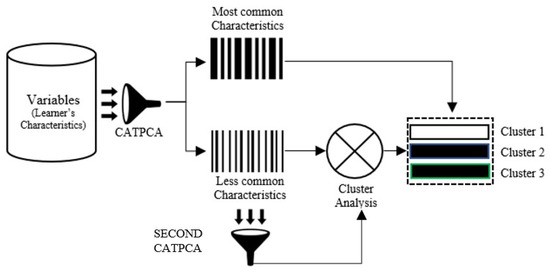
Figure 3.
Macro perspective of the cluster analysis procedure.
Using the less frequent variables, a second CATPCA was carried out to verify that the variance of the model had increased because the variables used were not expected. Then, homogeneous groups were created using SPSS through cluster analysis with the data from the less frequent variables. Afterward, we used the Euclidean measure to measure the distance between the observations as it allows the measurement of categorical or dichotomous intervals, which is the case in our survey [61]. Next, Ward’s grouping method was used because it forms homogeneous groups at the earliest distance, and there are no single values [62]. Finally, depending on the members of each cluster, the most common characteristics identified in the first CATPCA were assigned (see Figure 3).
It is important to mention that this analysis was carried out to create a MOOC in the future that responds to the needs of a large number of operators in such a way that the MOOC is academically relevant and economically viable.
4. Results
4.1. Significant Learning Characteristics in the MOOC Design
Figure 4 shows the bi-spatial dispersion diagram obtained by carrying out the first CATPCA using the 184 variables. The dispersion between the mean distance of the 184 variables concerning the centroid can be seen in the diagram. This is because there are variables closer to or farther from the centroid. Those variables closer to the centroid have less variability; therefore, they are the operators’ most common characteristics [81].
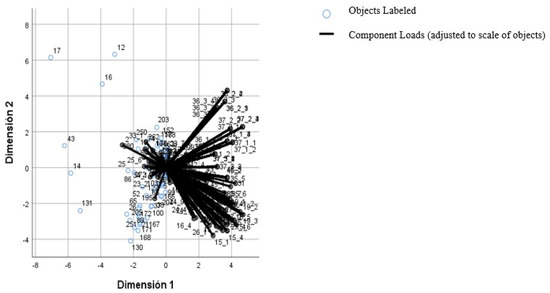
Figure 4.
Bi-spatial scatterplot—first CATPCA.
On the other hand, the summary of the model (Table 6) explains a total accounted variance of 29% with a Cronbach’s alpha index equal to 0.986, which shows that being close to 1, the analysis has high reliability using the method of optimal scaling—CATPCA [82].

Table 6.
Model summary—first CATPCA.
The threshold used for the refinement level of the model was calculated using the Sturges rule in a frequency table. In addition, an ogive diagram was used to complement the analysis (Table 7 and Figure 5). The frequency table shows that the values obtained from the mean distance of the coordinates for each variable are between 0.001 and 0.378. In addition, it can be seen in the ogive diagram that 57% of the variables that are grouped in a range between 0.00–0.177 are very frequent variables among the operators. However, above all, they are variables that have important information for the design of a personalized MOOC (Table 8) [54]. In this way, the variables with a value equal to or less than 0.177 were considered variables with little variability. Although it is worth mentioning that the model’s refinement level will always be subject to the research criteria by the researchers, in this case, the model was refined to the value of 0.177 as we consider that those variables frequent among the operators are also important for the instructional design of a MOOC [81].

Table 7.
Frequency table using Sturges’ rule.
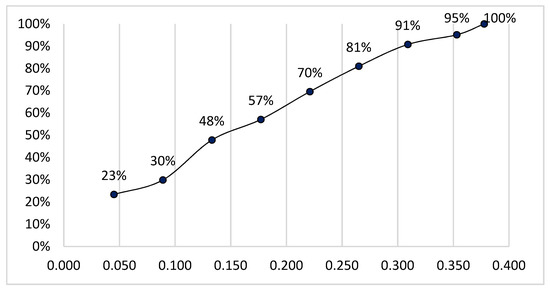
Figure 5.
Ogive graph—values of the mean distance of the coordinates of each variable.

Table 8.
Characteristics and most frequent learning needs among operators.
Finally, after reviewing the variables with little variability, the most common water sector operators’ characteristics were identified. Next, Table 8 identifies the variables with less variability that are part of the most frequent learning characteristics.
Considering the variables obtained, we could say that the most frequent characteristics describe the following operator profile.
Target Learners Profile: Operators have quality internet access at home, as well as access to computers and smartphones. Their educational level is high school, and they have between 1 and 5 years of operator experience. They prefer the course to be online and face-to-face, containing mainly videos, practical exercises, hands-on activities, and reading focused on real situations and their daily activities. They would like to be trained in topics such as valves, pump types, reservoirs, power generators, in-line sensors, surface water, chemical feeders, wells, health risk assessment, and economic aspects. They would prefer the MOOC to last four weeks and to dedicate two hours per week to the learning.
4.2. Clustering Results
Before showing the clustering results, it is important to specify that a second CATPCA was applied using 47% of the variables with high variability, that is, those variables that obtained a value above 0.177. As a result, the variance obtained from the model’s summary went from 29% to 52%. This change was expected because the analysis took the variables with the greatest variability. Likewise, the Cronbach’s alpha index took a value of 0.988, which shows that being close to 1, the analysis has high reliability using the optimal scaling method—CATPCA. Table 9 describes the results.

Table 9.
Model summary—second CATPCA.
The cluster analysis was performed considering these previous results. Figure A1 shows the agglomerative hierarchical clustering dendrogram with the Euclidean distance and Ward’s method. Furthermore, Figure 6 shows the frequencies of the three types of clusters:
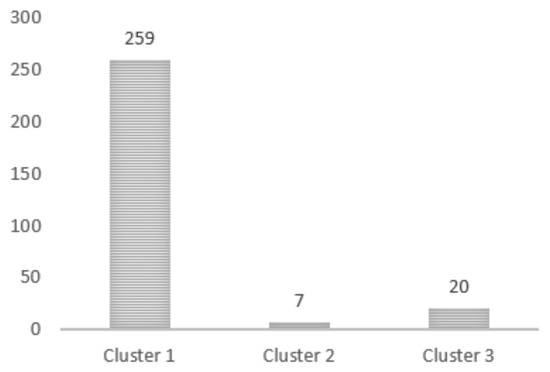
Figure 6.
Total operators per cluster.
Cluster 1 “Motivations and training needs”: 259 operators.
Cluster 2 “Missing value”: 7 operators.
Cluster 3 “Social”: 20 operators.
When analyzing cluster 1, it is observed that the characteristics with the highest frequency among the operators show that they have the value of at least 60% of the mode frequency and are related to aspects of (1) motivation or reasons for taking an online course and (2) training needs (Table 10). In this case, important reasons for taking an online course would be to keep their job, get certified, improve job performance, and gain or strengthen knowledge. Regarding training topics, they mainly prefer topics on pumps and motors and water main disinfection.

Table 10.
Cluster 1—characteristics preferred by operators.
Cluster 2 contains the least number of people since its grouping characteristics are variables the respondents did not answer. So, in this case, it would be “missing value”. Table 11 shows the variables with the highest mode frequency that were not answered.

Table 11.
Cluster 2—missing value variables.
Finally, cluster 3 was a group with 20 people whose variables are most frequently related to social aspects, the important reasons for taking an online course, and some technical aspects required to train. Table 12 below shows the variables with the highest mode frequency.

Table 12.
Cluster 3—characteristics preferred by operators.
In this cluster, the primary motivation for taking a course online is to keep their job. Likewise, the type of activity “lessons” stands out as important for understanding a topic. Furthermore, the operators of this cluster self-evaluate themselves as people with social and teamwork skills. Finally, the most preferred topics are smart metering and models for drinking water treatment.
Using the less common variables, the cluster analysis allowed us to create homogeneous groups by measuring the variables between individuals; that is, when comparing the total number of variables between individuals, we were able to identify individuals that coincided in specific characteristics, forming a cluster with 90% of the individuals, which is cluster 1.
5. Discussion
5.1. RQ 1: Characteristics and Learning Needs of Drinking Water Operators
The results obtained in the first CATPCA identify frequent learning characteristics that are related to (1) personal, (2) academic, and (4) cognitive aspects. In addition, learning needs are identified related to (6) the content required by the operators in technical aspects, as well as (7) the preferences and learning expectations in MOOC.
At the beginning of this research, the main concern was focused on (1) personal aspects understood mainly as demographic, such as level of education or literacy, access to computers or cell phones, and quality internet access, are variables that condition access and performance in an online course. Among the most important results, it was identified that the operators have access to a computer and a good−quality internet connection. In the beginning, we questioned the integrity of the results obtained, even more so when previous studies indicate that these variables impede access in developing countries due to technological infrastructure or economic aspects [83]. After validating the results obtained with some operators and with the human talent managers of the companies, it was concluded that the COVID−19 pandemic had accelerated access to equipment and the internet as their relatives had to carry out their studies or telecommute from home.
Regarding the level of education, this is a factor that can influence the dropout rate of students. Some studies indicate that the secondary education level has the highest dropout rate [9]. However, in the local, regional, and global context, it is known that the level of education of water operators is primary or secondary [7]. In the case of the selected sample, most operators have a high school certificate. Perhaps this result could be encouraging if we consider the global context. However, it is a variable to take into account in designing and implementing a MOOC related to drinking water in an online learning environment.
Regarding the academic aspects (2), the most common variables are related to years of work experience and e−learning experience. The most relevant option chosen by the operators in terms of work experience is in the 1− to 5−year range. Considering the results of the level of education as well as range of work experience and comparing them to the certification requirements established by the California Water Boards [20], we could say that in that range of experience, we could have operators with an advanced, intermediate, and limited experience in drinking water treatment. In effect, the work experience variable could influence the MOOC’s performance due to the difference in knowledge between an operator with one year of experience in contrast with someone with five years of experience. In addition, professional experience is known to influence student performance [11,84]. On the other hand, regarding online courses, operators believe that they are very long, there is no feedback, and the activities are not focused on real situations. These perceptions are concurrent with previous studies, which indicate that these aspects affect the course quality and generate dropouts [30,85,86]. These results invite us to reflect on the training that operators should receive, that is, it is important to understand the best practices of a water system at a global level, but it is also important to adapt them to a local context, where the infrastructure, technology, and the processes in the treatment of water are different due to climatic factors or the demographic aspects of a locality. In addition, social, demographic, economic, political, technological, and environmental backgrounds are typical of the idiosyncrasy of a country. Therefore, it is important that the content creation of a personalized MOOC considers good practices worldwide, but executed with learning strategies in a local context. That way, it responds to the learning needs identified to promote engagement by the operator and generate positive performance in the MOOC. Regarding the result of the previous experience in the e−learning variable, it caught our attention because a significant number of people had taken online courses. However, we believe that the context of the COVID−19 pandemic could have confused the operator when filling out the survey because currently, any training delivered through a device is believed to be online education when it is, in fact, remote or emerging education.
Regarding the cognitive aspect (4), the activity that operators most prefer to use in order to understand a subject of work or study is watching videos. Therefore, this type of resource becomes a guiding principle in the instructional design of a MOOC for water operators. Some studies show how videos positively impact both the cognitive and the affective and behavioral parts [84]. In addition, videos have been a fundamental pillar in online and distance learning for the last 50 years and comply with the concept of andragogy through self−direction and orientation to students needs [87].
One element to consider is that the variables linked to (5) the social aspect did not obtain a significant value, even though the operators’ daily activities are generally carried out in groups. This result drew our attention because studies consider the social aspect as an important factor in student performance, more than anything in gamification in MOOCs [53]. However, gamification is not part of our study’s personalization concept. We also know that, according to the reviewed literature, the social aspect is not a root cause that influences student dropout, unlike content quality, experience, or academic skills [11]. The variables linked to (3) emotional aspects, such as time management, searching for information, or asking for help, did not obtain a significant value of less than 0.177. However, in this case, when we analyze the data descriptively, we notice that when most operators have a complicated technical problem, they look for information on the internet, ask a colleague for help, or review a book. At the inferential level, there is no significance between the variables or one variable that stands out over the others. However, at a descriptive level, we can say that the operators use the three prior variables when they have a complicated problem. Thus, their behavior could be related to the self−regulation learning technique, which, according to the literature review carried out by Broadbent et al. [88], shows that in some studies, these variables are critical to a MOOC’s performance.
There are several (6) content requirements in terms of training. However, those most required in water treatment and distribution are valves, pump types, in−line sensors, power generators, chemical feeders, reservoirs, wells, and water surfaces. Also included in these training requirements is the interest in topics related to evaluating health risks in water consumption and understanding the economic aspects of managing a drinking water system.
Finally, the aspect related to (7) expectations and learning preferences has the most significant number of frequent variables. So, elaborating an instructional design to create a personalized MOOC is essential because it contributes information about how water operators are willing to learn. In this sense, the operators indicate that the aspects that would make it difficult to complete a drinking water treatment MOOC are that the activities are not focused on solving real problems and are unrelated to their everyday work situations. In addition, they indicate that the duration of the course and not receiving feedback from the teacher are also aspects that would make it difficult to complete the course. These variables are related to (2) the academic aspects. Thus, the preference in terms of how operators learn is consolidated. The type of activities they prefer in the course are hands−on activities focused on real−life situations and their work. In addition, they opt for the course to be online and face−to−face. These last variables are related to MOOCs’ challenges when designing learning strategies in courses focused on science or engineering [25]. On the other hand, operators prefer a course to last four weeks with a dedication time of two hours a week. They also prefer to take the course at home instead of at work. Conversations with the operators show they do not have time to take the course at work. However, large companies have training plans and physical infrastructure policies where operators can receive training during working hours, but this is not true in Ecuador. However, the companies that are part of the study are committed to providing their operators with enough time to take a MOOC and handle the demands of online learning. Finally, operators prefer to take the course with friends or colleagues. We know that, according to the reviewed literature, studies show that the student is less likely to drop out of the course when they register with somebody they know [89].
5.2. RQ 2: Interpretations of Clusters Characteristics
The results obtained evidence of three conglomerations from the distances between variables with more significant variability. Each cluster was labeled with a name based on the characteristics identified as relevant concerning the frequency analysis performed. In this part of the discussion, we will focus on cluster 1, because it represents approximately 90% of the operators and how its members are related to the most frequent characteristics identified in the first CATPCA in a way that answers the proposed research question.
With 259 operators, cluster one constitutes the largest group of operators and represents 90% of the population selected for this study. In general, the characteristics of the operators of this cluster show an interest in learning about various topics related to the treatment and distribution of water, such as pumps, motors, and the disinfection of drinking water. These aspects are actually their motivations to take the online course. Nonetheless, they do not provide enough information to design a personalized MOOC that responds to students’ learning characteristics, interests, and likes. Therefore, this discussion led us to analyze whether cluster 1 reflects the most frequent characteristics identified in the first CATPCA and is essential for instructional design. Indeed, in Table 13, the frequency of operators belonging to cluster 1 can be seen for each dimension of the most frequent learning characteristics. In the personal aspect, it is evident that approximately 76% of the operators have at least a secondary education, have access to computers or cell phones, and access to quality internet. For the academic aspect, approximately 67% have prior experience taking an online course, and 40% have between 1 and 5 years of work experience in the water system sector. It is worth mentioning that the percentage of work experience in the least frequency range may be interpreted as low; however, we also understand that this is evident in Ecuador, the region, and worldwide due to political or economic factors affecting the ability of management to retain workers. In terms of the cognitive aspect, 67% of the workers consider that watching videos and doing exercises is effective to understand a subject of study or work. Moreover, 86% of the operators prefer the course to last four weeks and with a dedication time of 2 h a week. Approximately 98% of the operators prefer the practical activities of the course to be focused on solving real problems adapted to their daily activities. In addition, 98% of operators prefer the MOOC to contain videos and practical exercises, 71% prefer to take the course with a friend, and 76% prefer to take the course in person and online. Finally, 60% prefer to complete the course at home.

Table 13.
Percentage of cluster 1 operators with the most frequent characteristics.
Now, considering the most frequent characteristics identified in the entire population through the first CATPCA, we make an intersection with the most frequent characteristics identified in cluster 1. Then we will have created a homogeneous super cluster with frequent characteristics that are reflected in most of the population, which are essential for elaborating the instructional design of a personalized MOOC. In this sense, we would have the following profile.
Target Learners Profile: Operators have quality internet access at home, as well as access to computers and smartphones. Their educational level is high school, and they have between 1 and 5 years of operator experience. They prefer the course to be online and face−to−face, containing mainly videos, practical exercises, hands−on activities, and reading focused on real situations and their daily activities. They would like to be trained in topics such as valves, pump types, reservoirs, power generators, in−line sensors, surface water, chemical feeders, wells, health risk assessment, and economic aspects. They prefer the MOOC to last four weeks and dedicate 2 h per week to their learning. They would like to register with friends/colleagues and opt to take the course at home. Finally, the main motivations for taking the course would be to obtain a certification and improve their performance at work.
The difference between the profile description using the PCA and the supercluster profile is that the motivations are identified in the supercluster.
Finally, a limitation of this research is not being able to find from the literature the application of CATPCA and clustering analysis as tools to identify characteristics and learning needs to design a MOOC. Other studies use these methodologies to describe users after completing a course and identify factors influencing dropout [9,48,61,90,91]. In addition, the MOOC personalization literature focuses more on adaptive learning based on student performance in a MOOC.
6. Conclusions
According to the results obtained, several implications can be made that result in practical actions or new research related to personalized learning in MOOCs. First, this study provides a methodology to identify and value learning needs and characteristics that facilitate elaborating the instructional design for a personalized MOOC. Variables were identified in personal, academic, and social factors as well as preferences and learning needs. In addition, the topics that operators need to learn both in the drinking water treatment process and in the distribution process were identified. Likewise, the type of activities and resources that they prefer to carry out in an online course were identified, as well as the duration of the course and the time dedicated to it. An implication for new research would be to conduct a causal analysis to find out why social aspects are not a frequent characteristic among operators when it is known that operators work in groups. On the other hand, it was possible to create a homogeneous cluster that contains the largest number of operators with significant characteristics and needs for the elaboration of the instructional design, as well as their main motivations for taking an online course.
Finally, this work proposes a practical approach for the design and application of a survey, as well as the data access, collection, processing, and analysis. In summary, this work has allowed us to draw some conclusions and establish implications for future theoretical or practical research.
7. Future Work
According to the findings, a quality instructional design will be carried out considering the results obtained regarding learning characteristics, factors influencing dropout, quality criteria, and principles for preparing an instructional design.
Author Contributions
Conceptualization, M.B.-L., L.D.-G. and P.H.; data curation, M.B.-L.; methodology, T.S., M.V., M.B.-L. and O.A.; formal analysis, P.L.M.G., O.A., M.V., T.S., L.D.-G. and M.B.-L.; supervision, P.L.M.G., M.V. and O.A., writing—original draft, M.B.-L.; writing—review and editing, P.L.M.G., T.S. and P.H. All authors have read and agreed to the published version of the manuscript.
Funding
This research corresponds to project FIEC–258–2020, developed by the Faculty of Electrical and Computer Engineering. It was funded by the Vlir Network Ecuador—EC2019NET032A103.
Institutional Review Board Statement
The study was conducted in accordance with the Declaration of Helsinki and approved by the Research Deanship of ESPOL (approval code: FIEC−258−2020; Date: 21 August 2020).
Informed Consent Statement
Informed consent was obtained from all subjects involved in the study.
Data Availability Statement
The data that support the findings of this study are available on request from the corresponding author.
Acknowledgments
We would like to thank everyone who helped us with the research, especially the participants and authorities from the water companies. We would also like to thank the anonymous reviewers whose comments helped us improve the manuscript.
Conflicts of Interest
The authors declare no conflict of interest.
Appendix A

Table A1.
Factors influencing dropout.
Table A1.
Factors influencing dropout.
| Article | Factors |
|---|---|
| [71] |
|
| [70] |
|
| [72] |
|
| [73,74] |
|
| [74] |
|
| [92] | Empowerment of knowledge is encouraged through forums and communities |
| [93] | When a student loses a close peer, he is more likely to drop out |
| [94] |
|
| [95] | The main reasons that generate enthusiasm in the student are related to:
|
Appendix B

Figure A1.
Dendrogram using Ward Linkage Rescaled Distance Cluster Combine.
Figure A1.
Dendrogram using Ward Linkage Rescaled Distance Cluster Combine.

References
- Servicio Ecuatoriano de Normalización INEN. Listado de Productos Con Convenio Para La Utilización Del Certificado de Conformidad Con Sello de Calidad INEN. Available online: https://drive.google.com/file/d/1XCotTNYWkWUMd0EVJf-N6ACHJ_fA4nKl/view (accessed on 1 December 2021).
- Servicio Ecuatoriano de Normalización INEN. Norma Técnica Ecuatoriana NTE INEN 1108:2020 Agua Para Consumo Humano, Requisitos; Servicio Ecuatoriano de Normalización INEN: Quito, Ecuador, 2020; p. 14. [Google Scholar]
- Consejo Nacional de Competencia. Informe de La Competencia de Gestión de Agua Potable; Consejo Nacional de Competencia: Quito, Ecuador, 2019. [Google Scholar]
- Asociación de Municipalidades del Ecuador & Servicio Ecuatoriano de Normalización Agua Potable y Alcantarillado. Available online: https://www.ecuadorencifras.gob.ec/documentos/webinec/Encuestas_Ambientales/Municipios_2017/Agua_potable_alcantarillado2017/PRESENTACION_AGUA_2017.pdf (accessed on 3 May 2021).
- Consejo de Educación Superior Oferta Vigente Del Sistema de Educación Superior Del Ecuador. Available online: http://appcmi.ces.gob.ec/oferta_vigente/ (accessed on 10 October 2021).
- International Water Association. WASH Human Resource Capacity Gaps in 15 Developing Economies an Avoidable Crisis; Seacourt: Oxford, UK, 2014. [Google Scholar]
- Jordan, K. Massive Open Online Course Completion Rates Revisited: Assessment, Length and Attrition. Int. Rev. Res. Open Distance Learn. 2015, 16, 341–358. [Google Scholar] [CrossRef]
- Labrador, M.M.; Vargas, G.R.G.; Alvarado, J.; Caicedo, M. Survival and Risk Analysis in MOOCs. Turk. Online J. Distance Educ. 2019, 20, 149–159. [Google Scholar] [CrossRef]
- Feng, W.; Tang, J.; Liu, T.X. Understanding Dropouts in MOOCs. In Proceedings of the AAAI Conference on Artificial Intelligence, Honolulu, HI, USA, 27 January–1 February 2019; Volume 33, pp. 517–524. [Google Scholar] [CrossRef]
- Eriksson, T.; Adawi, T.; Stöhr, C. “Time Is the Bottleneck”: A Qualitative Study Exploring Why Learners Drop out of MOOCs. J. Comput. High. Educ. 2017, 29, 133–146. [Google Scholar] [CrossRef]
- Aldowah, H.; Al-Samarraie, H.; Alzahrani, A.I.; Alalwan, N. Factors Affecting Student Dropout in MOOCs: A Cause and Effect Decision-making Model. J. Comput. High. Educ. 2020, 32, 429–454. [Google Scholar] [CrossRef]
- Cooper, S.; Sahami, M. Education Reflections on Stanford’s MOOCs. Commun. ACM 2013, 56, 28–30. [Google Scholar] [CrossRef]
- Zapata-Ros, M. El Diseño Instruccional de Los MOOC y El de Los Nuevos Cursos Online Abiertos Personalizados. Rev. De Educ. A Distancia (RED) No. 45, 1-45 2015. N1–35. Available online: https://revistas.um.es/red/article/view/238661/181351 (accessed on 1 March 2022). [CrossRef]
- Vygotsky, L.S. Mind in Society. The Development of Higher Psychological Processes; Harvard University Press: Cambridge, MA, USA, 1979; Volume 92, ISBN 0674576284. [Google Scholar]
- Drachsler, H.; Kirschner, P.; Nederland, O.U. Learner Characteristics. Encycl. Sci. Learn. 2012, 1, 1743–1745. [Google Scholar] [CrossRef]
- World Health Organization. Guidelines for Drinking-water Quality; 2017; Volume 55, ISBN 9789241549950. [Google Scholar]
- Federation, W.E. Standard Methods for the Examination of Water and Wastewater Standard Methods for the Examination of Water and Wastewater. Available online: http://www.ajph.org/cgi/doi/10.2105/AJPH.51.6.940-a (accessed on 14 July 2021).
- The International Water Association (IWA). Human Resources Needs for Operation and Maitnenance of Water Technologies; The International Water Association (IWA): London, UK, 2015; pp. 1–126. [Google Scholar]
- Central Public Health & Environmental Engineering Organisation (CPHEEO) Manual on Operation and Maintenance of Water Supply System—2005. Available online: http://cpheeo.gov.in/cms/manual-on-operation--and-maintenance-of-water-supply-system-2005.php (accessed on 25 August 2022).
- California Water Boards. Water Treatment Minimum Qualifications for Examination/Certification; California Water Boards: Sacramento, CA, USA, 2016. [Google Scholar]
- California Water Boards. Drinking Water Treatment Exams Expected Range of Knowledge Exam; California Water Boards: Sacramento, CA, USA, 2016. [Google Scholar]
- Fournier, H.; Kop, R. MOOC Learning Experience Design: Issues and Challenges. Int. J. E-Learn. Corp. Gov. Healthc. High. Educ. 2015, 14, 289–304. [Google Scholar]
- Downes, S. Places to Go: Connectivism & Connective Knowledge. Innovate 2008, 5, 1–6. [Google Scholar]
- Shah, D. By The Numbers: MOOCs in 2021. Available online: https://www.classcentral.com/report/mooc-stats-2021/ (accessed on 25 August 2022).
- Ruipérez-Valiente, J.A.; Martin, S.; Reich, J.; Castro, M. The UnMOOCing Process: Extending the Impact of MOOC Educational Resources as OERs. Sustainability 2020, 12, 7346. [Google Scholar] [CrossRef]
- Arksey, H.; O’Malley, L. Scoping Studies: Towards a Methodological Framework. Int. J. Soc. Res. Methodol. Theory Pract. 2005, 8, 19–32. [Google Scholar] [CrossRef]
- Smith, B.; Eng, M. MOOCs: A Learning Journey. In International Conference on Hybrid Learning and Continuing Education; Springer: Berlin/Heidelberg, Germany, 2013; pp. 244–255. [Google Scholar] [CrossRef]
- Hayes, S. QAA MOOCs Network. 2015. Available online: https://pure.aston.ac.uk/ws/files/18622357/MOOCs_and_quality_a_review_of_the_recent_literature.pdf (accessed on 12 January 2022).
- Liyanagunawardena, T.R.; Lundqvist, K.; Mitchell, R.; Warburton, S.; Williams, S.A. A MOOC Taxonomy Based on Classification Schemes of MOOCs. Eur. J. Open Distance E-Learn. 2019, 22, 85–103. [Google Scholar] [CrossRef]
- Aydin, I.E.; Yazici, M. Drop-Out in MOOCs. Turk. Online J. Educ. Technol. TOJET 2020, 19, 9–17. [Google Scholar]
- Littlejohn, A.; Hood, N.; Milligan, C.; Mustain, P. Learning in MOOCs: Motivations and Self-Regulated Learning in MOOCs. Internet High. Educ. 2016, 29, 40–48. [Google Scholar] [CrossRef]
- Tsai, Y.; Lin, C.; Hong, J.; Tai, K. The Effects of Metacognition on Online Learning Interest and Continuance to Learn with MOOCs. Comput. Educ. 2018, 121, 18–29. [Google Scholar] [CrossRef]
- Watson, S.L.; Watson, W.R.; Yu, J.H.; Alamri, H.; Mueller, C. Learner Profiles of Attitudinal Learning in a MOOC: An Explanatory Sequential Mixed Methods Study. Comput. Educ. 2017, 114, 274–285. [Google Scholar] [CrossRef]
- Fidalgo-Blanco, Á.; Sein-Echaluce, M.L.; García-Peñalvo, F.J. Methodological Approach and Technological Framework to Break the Current Limitations of MOOC Model. J. Univers. Comput. Sci. 2015, 21, 712–734. [Google Scholar]
- Teixeira, A.; Garcia-Cabot, A.; Garcia-Lopez, E.; Mota, J.; De-Marcos, L. A New Competence-Based Approach for Personalizing Moocs in a Mobile Collaborative and Networked Environment. RIED. Rev. Iberoam. De Educ. A Distancia 2015, 19, 143–160. [Google Scholar] [CrossRef]
- Kizilcec, R.F.; Piech, C.; Schneider, E. Deconstructing Disengagement: Analyzing Learner Subpopulations in Massive Open Online Courses René. Comput. Educ. 2013, 3, 170–179. [Google Scholar] [CrossRef]
- Mackness, J.; Mak, S.; Williams, R. The Ideals and Reality of Participating in a MOOC. In Proceedings of the 7th International Conference on Networked Learning, Aalborg, Denmark, 3–4 May 2010; Volume 10, pp. 266–274. [Google Scholar]
- Pereira, J.; Sanz-santamaría, S.; Gutiérrez, J. Comparative Technical Analysis and Prospective of the Major Open Source MOOC Platforms. RED. Revista de Educación a Distancia, no. 44. 2014, pp. 73–87. Available online: https://www.um.es/ead/red/44/pereira.pdf (accessed on 2 August 2021).
- Conache, M.; Dima, R.; Mutu, A. A Comparative Analysis of MOOC (Massive Open Online Course) Platforms. Inform. Econ. 2016, 20, 4–14. [Google Scholar] [CrossRef]
- Stracke, C.M. Quality Reference Framework (QRF) for the Quality of MOOCs Quality Reference Framework (QRF) for the Quality of MOOCs Developed by MOOQ in Close Collaboration with All Interested Parties Worldwide. Available online: http://mooc-quality.eu/wp-content/uploads/2019/11/Quality_Reference_Framework_for_MOOCs_v11.pdf (accessed on 3 October 2020).
- Hendriks, R.A.; de Jong, P.G.M.; Admiraal, W.F.; Reinders, M.E.J. Instructional Design Quality in Medical Massive Open Online Courses for Integration into Campus Education. Med. Teach. 2020, 42, 156–163. [Google Scholar] [CrossRef] [PubMed]
- Ricart, S.; Villar-Navascués, R.A.; Gil-Guirado, S.; Hernández-Hernández, M.; Rico-Amorós, A.M.; Olcina-Cantos, J. Could MOOC-Takers’ Behavior Discuss the Meaning of Success-Dropout Rate? Players, Auditors, and Spectators in a Geographical Analysis Course about Natural Risks. Sustainability 2020, 12, 4878. [Google Scholar] [CrossRef]
- Daniel, S.J.; Cano, E.V.; Cervera, M.G. The Future of MOOCs: Adaptive Learning or Business Model? RUSC. Univ. Knowl. Soc. J. 2015, 12, 64–73. [Google Scholar] [CrossRef]
- Marosan, Z.; Savic, N.; Klasnja-Milicevic, A.; Ivanovic, M.; Vesin, B. Students’ Perceptions of ILS as a Learning-Style-Identification Tool in E-Learning Environments. Sustainability 2022, 14, 4426. [Google Scholar] [CrossRef]
- Graf, S.; Liu, T.C. Kinshuk Analysis of Learners’ Navigational Behaviour and Their Learning Styles in an Online Course. J. Comput. Assist. Learn. 2010, 26, 116–131. [Google Scholar] [CrossRef]
- Felder, R.; Silverman, L. Learning and Teaching Styles in Engineering Education. Eng. Educ. 1988, 78, 674–681. [Google Scholar]
- Coffield, F.; Moseley, D.; Hall, E.; Ecclestone, K.S. Learning Styles and Pedagogy in Post-16 Learning A Systematic and Critical Review; The Learning and Skills Research Centre: London, UK, 2004; p. 84. [Google Scholar]
- Chang, R.I.; Hung, Y.H.; Lin, C.F. Survey of Learning Experiences and Influence of Learning Style Preferences on User Intentions Regarding MOOCs. Br. J. Educ. Technol. 2015, 46, 528–541. [Google Scholar] [CrossRef]
- Li, C.; Zhou, H. Enhancing the Efficiency of Massive Online Learning by Integrating Intelligent Analysis into MOOCs with an Application to Education of Sustainability. Sustainability 2018, 10, 468. [Google Scholar] [CrossRef]
- Felder, R.M. Matters of Style. ASEE Prism 1996, 6, 18–23. Available online: https://www.engr.ncsu.edu/wp-content/uploads/drive/11WH3ejjNgI3zYDblRB6MSGhlQFYkxDIT/1996-LS-Prism.pdf (accessed on 12 May 2021).
- Kolb, D.A. Experiential Learning: Experience as The Source of Learning and Development; Prentice Hall, Inc.: Upper Saddle River, NJ, USA, 1984; pp. 20–38. [Google Scholar] [CrossRef]
- PASK, G. Styles and Strategies of Learning. Br. J. Educ. Psychol. 1976, 46, 128–148. [Google Scholar] [CrossRef]
- Antonaci, A.; Klemke, R.; Kreijns, K.; Specht, M. Get Gamification of MOOC Right! How to Embed the Individual and Social Aspects of MOOCs in Gamification Design. Int. J. Serious Games 2018, 5, 61–78. [Google Scholar] [CrossRef]
- Bonk, C.J.; Zhu, M.; Kim, M.; Xu, S.; Sabir, N.; Sari, A.R. Pushing toward a More Personalized MOOC: Exploring Instructor Selected Activities, Resources, and Technologies for MOOC Design and Implementation. Int. Rev. Res. Open Distance Learn. 2018, 19, 92–115. [Google Scholar] [CrossRef]
- Merrill, M.D. First Principles of Instruction. Educ. Technol. Res. Dev. 2002, 50, 43–59. [Google Scholar] [CrossRef]
- Margaryan, A.; Bianco, M.; Littlejohn, A. Computers & Education Instructional Quality of Massive Open Online Courses (MOOCs). Comput. Educ. 2015, 80, 77–83. [Google Scholar] [CrossRef]
- Mezirow, J. Transformative Learning: Theory to Practice. New Dir. Adult Contin. Educ. 1997, 1997, 5–12. [Google Scholar] [CrossRef]
- Hudson, L.; Wolff, A.; Gooch, D.; van der Linden, J.; Kortuem, G.; Petre, M.; ten Veen, R.; O’Connor-Gotra, S. Supporting Urban Change: Using a MOOC to Facilitate Attitudinal Learning and Participation in Smart Cities. Comput. Educ. 2019, 129, 37–47. [Google Scholar] [CrossRef]
- Watson, S.L.; Loizzo, J.; Watson, W.R.; Mueller, C.; Lim, J.; Ertmer, P.A. Instructional Design, Facilitation, and Perceived Learning Outcomes: An Exploratory Case Study of a Human Trafficking MOOC for Attitudinal Change. Educ. Technol. Res. Dev. 2016, 64, 1273–1300. [Google Scholar] [CrossRef]
- Lieberthal, R.D.; Comer, D.M. Validating the PRIDIT Method for Determining Hospital Quality with Outcomes Data. 2013. Available online: https://www.soa.org/globalassets/assets/files/research/projects/research-val-pridit-method-report.pdf (accessed on 21 May 2020).
- Kovanović, V.; Joksimović, S.; Poquet, O.; Hennis, T.; de Vries, P.; Hatala, M.; Dawson, S.; Siemens, G.; Gašević, D. Examining Communities of Inquiry in Massive Open Online Courses: The Role of Study Strategies. Internet High. Educ. 2019, 40, 20–43. [Google Scholar] [CrossRef]
- Goggins, S.P.; Galyen, K.D.; Petakovic, E.; Laffey, J.M. Connecting Performance to Social Structure and Pedagogy as a Pathway to Scaling Learning Analytics in MOOCs: An Exploratory Study. J. Comput. Assist. Learn. 2016, 32, 244–266. [Google Scholar] [CrossRef]
- Arrazola, J.R.; Zavala Umanzor, J.C. Diseño Metodológico Para La Selección de Una Muestra Representativa de Estudiantes Universitarios. Econ. Y Adm. (EA) 2017, 5, 54–67. [Google Scholar] [CrossRef]
- De Oudeweetering, V.; Agirdag, O. Demographic Data of MOOC Learners: Can Alternative Survey Deliveries Improve Current Understandings? Comput. Educ. 2018, 122, 169–178. [Google Scholar] [CrossRef]
- Morris, N.; Lambe, J. STUDYING A MOOC: A GUIDE 2014, 51. Available online: www.palgravestudyskills.com/studyingamooc (accessed on 10 March 2020).
- Bonk, C.J.; Lee, M.M. Motivations, Achievements, and Challenges of Self-Directed Informal Learners in Open Educational Environments and MOOCs the Rise of Massive Open Online Courses (MOOCs). J. Learn. Dev. 2017, 4, 36–57. [Google Scholar] [CrossRef]
- Chang, J.W.; Wei, H.Y. Exploring Engaging Gamification Mechanics in Massive Online Open Courses. Educ. Technol. Soc. 2016, 19, 177–203. [Google Scholar]
- California Water Boards. Water Distribution Exams Expected Range of Knowledge Disinfection; California Water Boards: Sacramento, CA, USA, 2016. [Google Scholar]
- Itani, A.; Brisson, L.; Garlatti, S. Understanding Learner’s Drop-Out in MOOCs. In International Conference on Intelligent Data Engineering and Automated Learning; Springer: Cham, Switzerland, 2018; pp. 233–244. [Google Scholar]
- El Said, G.R. Understanding How Learners Use Massive Open Online Courses and Why They Drop Out. J. Educ. Comput. Res. 2017, 55, 724–752. [Google Scholar] [CrossRef]
- Kim, T.-D.; Yang, M.-Y.; Bae, J.; Min, B.-A.; Lee, I.; Kim, J. Escape from Infinite Freedom: Effects of Constraining User Freedom on the Prevention of Dropout in an Online Learning Context. Comput. Hum. Behav. 2017, 66, 217–231. [Google Scholar] [CrossRef]
- Hone, K.S.; el Said, G.R. Exploring the Factors Affecting MOOC Retention: A Survey Study. Comput. Educ. 2016, 98, 157–168. [Google Scholar] [CrossRef]
- Kizilcec, R.F.; Halawa, S. Attrition and Achievement Gaps in Online Learning. In Proceedings of the L@S—2015 2nd ACM Conference on Learning at Scale, New York, NY, USA, 1–3 June 2015; pp. 57–66. [Google Scholar] [CrossRef]
- Zheng, S.; Rosson, M.B.; Shih, P.C.; Carroll, J.M. Understanding Student Motivation, Behaviors, and Perceptions in MOOCs. In Proceedings of the CSCW 2015—2015 ACM International Conference on Computer-Supported Cooperative Work and Social Computing, Vancouver, BC, Canada, 14–18 March 2015; pp. 1882–1895. [Google Scholar] [CrossRef]
- Komarraju, M.; Nadler, D. Self-Ef Fi Cacy and Academic Achievement: Why Do Implicit Beliefs, Goals, and Effort Regulation Matter? Learn. Individ. Differ. 2013, 25, 67–72. [Google Scholar] [CrossRef]
- Kizilcec, R.F.; Pérez-Sanagustín, M.; Maldonado, J.J. Self-Regulated Learning Strategies Predict Learner Behavior and Goal Attainment in Massive Open Online Courses. Comput. Educ. 2017, 104, 18–33. [Google Scholar] [CrossRef]
- Cooper, J.; Courtney-Pratt, H.; Fitzgerald, M. Key Influences Identified by First Year Undergraduate Nursing Students as Impacting on the Quality of Clinical Placement: A Qualitative Study. Nurse Educ. Today 2015, 35, 1004–1008. [Google Scholar] [CrossRef]
- Pinfield, S.; Cox, A.M.; Smith, J. Research Data Management and Libraries: Relationships, Activities, Drivers and Influences. PLoS ONE 2014, 9, 1–28. [Google Scholar] [CrossRef]
- Moreno-Morilla, C.; Guzmán-Simón, F.; García-Jiménez, E. Digital and Information Literacy inside and Outside Spanish Primary Education Schools. Learn. Cult. Soc. Interact. 2021, 28, 100455. [Google Scholar] [CrossRef]
- Zurita, G. Probabilidad y Estadística Fundamentos y Aplicaciones; segunda edición; Escuela Superior Politécnica del Litoral: Guayaquil, Ecuador, 2010; ISBN 9789978310557. Available online: https://bibliotecadigital.espol.edu.ec/library/publication/probabilidad-y-estadistica-fundamentos-y-aplicaciones-1631573754 (accessed on 10 May 2021).
- Starkweather, J.; Herrington, R. Categorical Principal Components Analysis (CATPCA) with Optimal Scaling. Available online: http://bayes.acs.unt.edu:8083/BayesContent/class/Jon/SPSS_SC/Module9/M9_CATPCA/SPSS_M9_CATPCA.htm (accessed on 15 March 2022).
- Martín-Jaime, J.J.; Velasco-Martínez, L.C.; Tójar-Hurtado, J.C. Evaluation of an Environmental Education Program Using a Cross-Sectoral Approach to Promote the Sustainable Use of Domestic Drains. Sustainability 2021, 13, 12041. [Google Scholar] [CrossRef]
- Van de Oudeweetering, K.; Agirdag, O. MOOCS as Accelerators of Social Mobility? A Systematic Review. Educ. Technol. Soc. 2018, 21, 1–11. [Google Scholar]
- Belanger, Y.; Thornton, J. Bioelectricity: A Quantitative Approach Duke University’s First MOOC; Duke Center For Instructional Technology: Durham, NC, USA, 2013. [Google Scholar]
- Hew, K.F. Promoting Engagement in Online Courses: What Strategies Can We Learn from Three Highly Rated MOOCS. Br. J. Educ. Technol. 2016, 47, 320–341. [Google Scholar] [CrossRef]
- Nanda, G.; Douglas, K.A.; Waller, D.R.; Merzdorf, H.E.; Goldwasser, D. Analyzing Large Collections of Open-Ended Feedback from MOOC Learners Using LDA Topic Modeling and Qualitative Analysis. IEEE Trans. Learn. Technol. 2021, 14, 146–160. [Google Scholar] [CrossRef]
- Fuller, J.S.; Brantley-Dias, L.; Lokey-Vega, A.; Woodham Langub, L. Learner Perceptions: Gauging the Effectiveness of Instructional Strategies Implemented in One University’s Inaugural MOOC. Open Learn. J. Open Distance e-Learn. 2021, 37, 1–20. Available online: https://www.tandfonline.com/doi/full/10.1080/02680513.2021.2011186 (accessed on 4 April 2022). [CrossRef]
- Broadbent, J.; Poon, W.L. Self-Regulated Learning Strategies & Academic Achievement in Online Higher Education Learning Environments: A Systematic Review. Internet High. Educ. 2015, 27, 1–13. [Google Scholar] [CrossRef]
- Kizilcec, R.F.; Schneider, E. Motivation as a Lens to Understand Online Learners: Toward Data-Driven Design with the OLEI Scale. ACM Trans. Comput.-Hum. Interact. 2015, 22, 1–24. [Google Scholar] [CrossRef]
- Albelbisi, N.A. Development and Validation of the MOOC Success Scale (MOOC-SS). Educ. Inf. Technol. 2020, 25, 4535–4555. [Google Scholar] [CrossRef]
- Castaño-Muñoz, J.; Kreijns, K.; Kalz, M.; Punie, Y. Does Digital Competence and Occupational Setting Influence MOOC Participation? Evidence from a Cross-Course Survey. J. Comput. High. Educ. 2017, 29, 28–46. [Google Scholar] [CrossRef]
- Rosé, C.P.; Carlson, R.; Yang, D.; Wen, M.; Resnick, L.; Goldman, P.; Sherer, J. Social Factors That Contribute to Attrition in MOOCs. In Proceedings of the L@S 2014—the 1st ACM Conference on Learning at Scale, Atlanta, GA, USA, 4–5 March 2014; pp. 197–198. [Google Scholar] [CrossRef]
- Yang, D.; Wen, M.; Rosé, C.P. Peer Influence on Student Attrition in Massively Open Online Courses. In Proceedings of the 7th International Conference on Educational Data Mining, Bangalore, India, 11–14 July 2014; pp. 405–406. [Google Scholar]
- Khalil, H.; Ebner, M. MOOCs Completion Rates and Possible Methods to Improve Retention—A Literature Review. In Proceedings of the EdMedia: World Conference on Educational Media and Technology, Tampere, Finland, 23–26 June 2014; Volume 2014, pp. 1305–1313. [Google Scholar]
- Liu, M.; Kang, J.; Cao, M.; Lim, M.; Ko, Y.; Myers, R.; Schmitz Weiss, A. Understanding MOOCs as an Emerging Online Learning Tool: Perspectives from the Students. Am. J. Distance Educ. 2014, 28, 147–159. [Google Scholar] [CrossRef]
Publisher’s Note: MDPI stays neutral with regard to jurisdictional claims in published maps and institutional affiliations. |
© 2022 by the authors. Licensee MDPI, Basel, Switzerland. This article is an open access article distributed under the terms and conditions of the Creative Commons Attribution (CC BY) license (https://creativecommons.org/licenses/by/4.0/).

